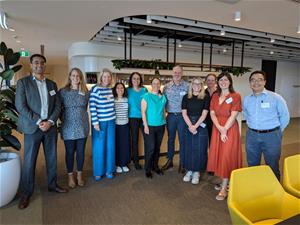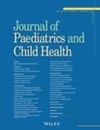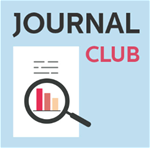Pot-pourri eBulletin - 11 November 2024

I’ve been talking a lot lately about our efforts to raise the age of criminal responsibility from 10 years to 14 years across Australia, and the disappointment experienced by the ongoing challenges to that advocacy. The effects of detention facilities on young people can be particularly damaging for those with disabilities relating to brain function, such as fetal alcohol spectrum disorder (FASD). Earlier this month an article was published on The Conversation, authored by Professor Elizabeth Elliott AM and Dr Fiona Robards, titled: We shouldn’t lock up young offenders with fetal alcohol spectrum disorder. Here are the alternatives.
The article explains, in simple terms, some of the reasons behind these kids' actions and how crucial it is to consider alternatives to youth detention including early detection to prevent re-offending. I encourage you to read the article and share it when you can to help our advocacy through greater understanding.
For those members with access to the Judicial Quarterly Review I’ll direct you to this additional information: Robards F; Milne B, Elliott EJ, Addressing the challenges of FASD for adolescents in the justice system, Judicial Quarterly Review, 2024, 2(1), 11-26.
It was my great honour and pleasure recently to serve as part of the judging panel for the 2024 Rue Wright Memorial Award. Held via webinar on the evening of 22 October, we saw four trainees and four Fellows presenting their research on a wide range of Community Child Health topics. The quality of all presentations was very high, making our work as judges quite difficult, but ultimately the award was presented to:
Dr Ella Tracey (best trainee recipient) for: Do priority population children and young people have an excess risk of in-hospital mortality in a tertiary children’s network, Australia?
Dr Santuri Rungan (best Fellow recipient) for: Childhood behavioural disorders: Partnerships between the health and education sectors.
My thanks go to Dr Paul Hotton, Chair of the Chapter of Community Child Health Committee, the reviewers, my fellow judges on the night (Associate Professor Yvonne Anderson, Professor Sharon Goldfeld, and Dr Niroshini Kennedy), supporting College staff, and of course all those who presented their excellent work on the evening. Well done all of you!
I attended the National Paediatric DPE forum held recently at the College’s Sydney offices. DPEs (Directors of Physician or Paediatric Education) are the key to the successful implementation of the College’s education and training program at the grassroot level. My involvement with the workings of the RACP started as the DPE for Queensland Children’s Hospital, a role which I have thoroughly enjoyed over the last 10 years and am still loving. At the workshop we saw the first live demonstration of the Training Management Platform.

This month will also see me attending the 18th Asia Pacific Congress of Pediatrics (APCP) in Cebu City, Philippines. The event will be held from 14 to17 November and I have the honour of being their plenary speaker. You can read more about the APCP here.
Last but definitely not least, I’m looking forward to attending the College’s Convocation Ceremony in Melbourne later this month. It will be my last opportunity to do so as PCHD President as I’ll be stepping aside for the incoming President, Dr Niroshini Kennedy next May. I’m particularly delighted to have my family – my wife and my two daughters – coming along to share in the joy of the occasion. I have had the privilege of playing a part in several of these ceremonies and I always feel a sense of great honour and pride in our outstanding new Fellows. I can’t wait to meet you.
Professor Nitin Kapur
PCHD President
Several positions are available on PCHD committees. Please consider applying for suitable positions and/or encouraging your colleagues. If you have any questions about any of the PCHD committee positions, please contact Paed@racp.edu.au.
All Expressions of Interest
Open now: RACP Indigenous Health Scholarships
The RACP Indigenous Health Scholarship Program aims to support those medical graduates and current trainees of the RACP who identify as Aboriginal, Torres Strait Islander or Māori on their chosen career path to becoming a physician. The scholarships provide a funded pathway through basic, advanced, faculty or chapter training in Australia and/or Aotearoa New Zealand.
Several scholarships are available for 2025:
- College Indigenous Australian and Māori Health Scholarship
- Aboriginal and Torres Strait Islander Health Scholarship
Applications close 30 November 2024. Further details on these scholarships are available on the RACP Foundation website.
2024 New Fellow Survey results
.jpg?sfvrsn=f74da11a_1)
Thank you to the new Fellows who participated in the 2024 New Fellow Survey. Twelve per cent of new Fellows shared their feedback in June and July, offering valuable insights into how well RACP training prepared them for unsupervised practice.
Key Findings
Most new Fellows reported feeling prepared for unsupervised practice, especially when it comes to communication, medical expertise, judgement, decision-making, and ethics. However, gaps were identified in health policy systems, advocacy, and research competencies.
New Fellows faced challenges with:
- Feeling confident in leadership positions
- Adjusting to a less supported environment
- Balancing new workload expectations
- Consistent employment and job security
- Navigating private practice
Approximately one-fifth of respondents found the transition to unsupervised practice challenging, with over half suggesting that additional support from RACP would be beneficial. Difficulties were also reported in work/life balance, accessing RACP support when needed, and completing the Advanced Training Research Projects.
Our Response
These survey findings, alongside other feedback, are helping shape College initiatives such as a Health Policy, a Systems and Advocacy online course, and enhanced supervisory training. We are actively working to address these areas across the RACP.
For more information, visit the New Fellow Survey Page on the RACP website for a summary report of the findings.
2024 Member Statistics and Insights Report
The RACP 2024 Member Statistics and Insights Report has just been released. This report provides an aggregated snapshot of College membership as at 30 June 2024 using member data from the College’s customer relationship management (CRM) system.
The report displays a range of characteristics of the membership including demographic measures such as age, gender and location, as well as other characteristics such as largest training sites, specialty etc. Additional analysis has also enabled the report to include trend information about various characteristics of the membership over a number of years.
If you have any questions or feedback, please contact us.
Pharmaceutical Benefits Scheme (PBS) listings
New and amended Pharmaceutical Benefits Scheme (PBS) listings are available here. This information relates to the administration of these listings by Services Australia.
For further information on broader PBS changes, please visit the PBS website
Journal of Paediatrics and Child Health

The Journal of Paediatrics and Child Health publishes original research articles of scientific excellence in paediatrics and child health. The latest edition is now live and available to view online.
Some topics include:
- A case of thyroid storm in a child associated with transient central diabetes insipidus
- Antenatal counselling at the cusp of viability and parental decision-making in the zone of parental discretion: A cohort study
- Paediatric oral and maxillofacial biopsies: A retrospective institutional archival study
Read the journal
[Journal Club] Thrombolysis up to 24 hours after ischaemic stroke

Thrombectomy for acute ischaemic stroke has undergone great advances in the last decade, but the expertise and technology is restricted to tertiary hospitals. Outside of large metropolitan centres, thrombolytic treatment can buy a patient time, but for almost 30 years the first line agent has remained unchanged. Alteplase is an analog of the human tissue plasminogen activator which activates plasmin to dissolve fibrin blood clots. For many years it was assumed that alteplase should be administered within three hours of symptom onset, thus it was a big deal when in 2008, research showed that that window could be safely broadened to four and a half hours.
Today’s guests have over the intervening years been pushing the envelope even further, in an effort to help more than two-thirds of stroke patients who present after that threshold. In this podcast, Professors Bruce Campbell and Mark Parsons discuss a trial of the relatively novel agent, tenecteplase. The publication in the New England Journal of Medicine showed that tenecteplase could improve patient outcomes even if administered up to 24 hours out from a large vessel occlusion. The researchers explain the steps that led up to their study, and the importance of perfusion imaging to identify candidates with salvageable brain tissue.
Key Reference
Tenecteplase for Ischemic Stroke at 4.5 to 24 Hours without Thrombectomy [NEJM. 2024]
Guests
Dr Duncan Austin PhD FRACP MRCP (Cabrini Health)
Professor Bruce Campbell PhD FRACP (Cabrini Health; Royal Melbourne Hospital; University of Melbourne)
Professor Mark Parsons PhD FRACP, FAAHMS (Sydney Neurointerventional Specialists; Consulting in Neurology, Maitland).
Please visit the Pomegranate Health web page for a transcript and supporting references. Login to MyCPD to record listening and reading as a prefilled learning activity. Subscribe to new episode email alerts or search for ‘Pomegranate Health’ in Apple Podcasts, Spotify, Castbox or any podcasting app.
Visit:
Pomegranate (racp.edu.au) for the full episode.
You’ve told us that you need your College to be more responsive and supportive. We’ve listened to your feedback and we’re establishing a new Member Support Centre to help you navigate your College, improve enquiry response and resolution times and better support your needs. Thank you for your feedback – it helps us improve.
Did you know that you can update your address details online? Simply Login to MyRACP and go to “Edit my details”.
RACP Benefits: Exclusive savings on your lifestyle needs

Did you know that RACP Benefits gives you access to a range of discounts and offers from Australia and Aotearoa New Zealand’s leading brands and retailers? Simply log in to the portal to start shopping and saving today. These special deals are exclusive to the College and made possible by our benefits partner, Member Benefits Australia.
Log in or find out more.
Pomegranate Health podcast: Your contributions welcome
The RACP podcast, Pomegranate Health, has published over 100 episodes since starting out eight years ago.
To provide more frequent and focused content we’re seeking contributions from our speciality societies, committees and affiliated professional organisations.
To hear what this would sound like, listen to the episodes tagged [IMJ On-Air]
These episodes feature authors published in the Internal Medicine Journal being interviewed by the relevant section editor.
They have covered themes as varied as asthma management, hospital-acquired complications, causes of readmission and the JEV outbreak.
You already spend considerable time preparing lectures and webinars for your colleagues.
Audio podcasts provide an easy way to reach thousands more around the world.
Each episode gets downloaded around 6500 times over the first 12 months from publication, with 21 per cent of listeners located outside of Australia and Aotearoa New Zealand.
All you need to do is to organise one or more presenters and an interviewer familiar with the material. The podcast producer will coordinate an online recording lasting about one hour and then edit it down before publication. The intention would be to ‘brand’ regular episodes from your specialty society or organisation in the same way that we’ve done with [IMJ On-Air].
Please send any questions or ideas to podcast@racp.edu.au
View all career opportunities on the RACP website.
To submit an article for publishing in Pot-pourri, please email paed@racp.edu.au. The article should be no more than 350 words. If you would like to submit an image with your article, it would be assumed that you have received appropriate permission to use the photo and it needs to be of high resolution, above 300 dpi. Please note that articles may need to be edited by the RACP Communications Team.